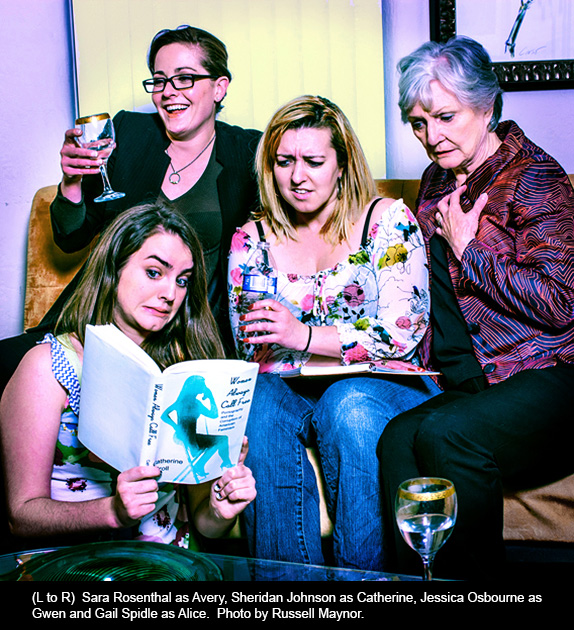
A full-throated debate over women’s equality might seem to be a pointless rhetorical replay of the arguments of our parents or even our grandparents. But that turns out to be hardly true.
As illustration, recall the passage from Just Fly the Plane, Stupid, the new memoir by our own congressman, Republican Steve Pearce, in which he said he and his wife agreed to follow a biblical injection that a woman would follow her husband and be subordinate to him. Pearce wrote: “The wife is to voluntarily submit, just as the husband is to lovingly lead and sacrifice. The husband’s part is to show up during the times of deep stress, take the leadership role and be accountable for the outcome, blaming no one else."
A similar theme is debated in Rapture, Blister, Burn, a thoughtful new play at the Aux Dog Theater in Albuquerque’s Nob Hill, which will have its last performances 8 p.m. Friday and Saturday, and 2 p.m. Sunday after a three-week run.
“Two people can’t both go first,” one character asserts, echoing the sentiments of Pearce as well as the anti-feminist diatribes of Phylis Shaffly some 40 years ago.
The same character rejects women’s sexual freedom with the aphorism that if the milk is free, why should anyone buy the cow?
The message of this play is not that such sentiments should be guideposts for modern women, but rather that you have indeed come a long way, baby, as the old Virginia Slims commercial declared, so far, in fact, that it is no longer necessary or even possible to prescribe a single lifestyle for all women.
This understanding, sometimes called the fourth wave of the feminist movement, makes the term women libbers sound about as archaic as suffragettes. Liberated from what? Women now make up a majority of college students, college graduates and enrollees in many graduate schools. While men have largely been stuck in their historical ruts, women have moved into most male professions. The last bastion for women to conquer would seem to be political power, but even the rampart of the presidency could fall in two years. About all that is left for women to be liberated from is themselves, and that is what Rapture is really all about.
However, archaic and even sexist concepts that are generally regarded as well outside the current consensus are given serious consideration side by side with more widely accepted notions of female equality. What the play arrives at finally is an interesting version of feminism: It is less important what route a woman follows—whether focusing on family or work, living with a man or alone, trying to have it all or settling for far less—than that she have the opportunity and the courage to choose her own path, which, ultimately, each of the five characters in this comedy-drama do.
The characters represent an older woman who lives by herself, her daughter who is a high-powered single professional, the daughter’s friend (and sometime rival) who is a stay-at-home mom and the friend’s liberated 21-year-old babysitter, who unexpectedly turns out be the play’s ultimate voice of authority. The remaining character is the husband of the mom and the former lover of the professional, an easy-going man who just enjoys life and spends a lot of time on pornography. In fact his interest in porn helps spark one of the play’s most engaging and perceptive debates.
Each of the five characters reexamines his or her life during the course of the play, tries on a different role and ultimately concludes it doesn’t fit. Each long ago made a decision to be what he or she is, and finally comes to accept that role, with all its strengths and weaknesses, its good and its bad qualities.
Just as the characters have to reexamine their lives, so the audience is forced to reexamine its assumptions. Any play that can do that is worth our time, as Rapture, Blister, Burn certainly is. When three generations of women in the final scene toast themselves and declare, “You’re free,” we believe it.
Ryan Montenery as Don Harper, Gail Gillock Spidle as Alice Croll, Sheridan Johnson as Catherine Croll, Jessica Osbourne as Gwen Harper and Sara Rosenthal as Avery Willard create a coherent ensemble performance that manages to be both energetic and intellectual at the same time, no mean feat. Director Kristine Holtvedt skillfully manipulates the wit of Pulitzer-nominated playwright Gina Gionfriddo. The set is a model of flexibility, skillfully shifting according to the play’s several scenes.
Call 505-254-7716 for tickets and information.




Responses to “Feminism revisited on the Albuquerque stage”